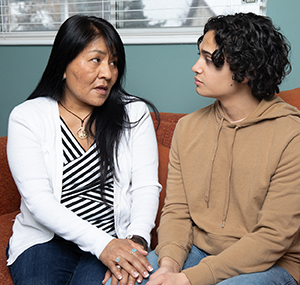When You Suspect Your Child Is Using Alcohol or Drugs
One of many parents’ biggest fears is that their child will use alcohol or drugs. Alcohol or drug use can harm your child’s growing brain. And use can develop into addiction. So, it's a serious issue. If you suspect that your child is using, take action. Getting help and attention early allows for the best outcome. Talk to your child first in a supportive, non-accusatory manner. Then, get help from professionals. Below are some tips to help guide you.
Warning signs of possible alcohol or drug use
The following can be signs that a teen has been using alcohol or drugs:
-
Sudden or large drop in grades
-
More secrecy around belongings or activities
-
Changes in friends
-
Sudden mood or personality changes
-
Irresponsible behavior
-
Increase in arguments and breaking rules
|
|
Talk with your child

Talking to teens is often difficult. Talking about sensitive issues like drugs can be especially hard. These tips can help:
-
Sit your child down for a face-to-face talk.
-
Tell your child the concerns you have. Be specific about what you have noticed about your child’s behavior that worries you.
-
Expect your child to deny drug or alcohol use. Don't argue. Your goal is to put the topic on the table and open a discussion.
-
Explain that as a parent, it’s your job to protect the child, and drugs and alcohol are dangerous. If there’s any chance that your child is using, you must act.
-
Keep your tone firm and loving, not accusatory or angry. Don't lose your temper. Anger is likely to make your child withdraw from you and make it harder for you to help.
-
If your child asks about your own past or current drug or alcohol use, be honest. But don’t dwell on your use. Focus instead on the potentially serious consequences of drug use in your own life and the lives of other adults.
-
Know that the conversation will be ongoing. One talk is never enough.
Talk with your child’s healthcare provider
Tell your child’s healthcare provider your concerns and what you have noticed about your child. Your child’s healthcare provider can help by:
-
Talking with your child about the dangers of alcohol and drug use
-
Suggesting further action you can take
-
Referring you to treatment programs or other healthcare professionals who can help with this issue
-
Helping develop a treatment plan for your child
Note that your child’s healthcare provider may have a confidential discussion with your child about alcohol and drugs. This means that the healthcare provider can't tell you what was discussed. This is to promote communication between your child and the healthcare provider. Talk to your child’s healthcare provider to learn more about this issue.
Be your child’s safety net
Make it very clear that your child can call you if they are drunk or high and needs a way to get home, or is otherwise in trouble. Be sure your child knows that though you disapprove of alcohol or drug use, your first thought is for their safety.
Help prevent use and abuse
Suggestions include:
-
Be a role model. One of the best ways you can help prevent drug and alcohol use by your child is to model the behavior you want to see. Studies have shown that if parents smoke, drink, or take drugs, their children are more likely to do these things, too. Don’t smoke, don’t do drugs, drink only in moderation or not at all, and never drink and drive.
-
Communicate. Start talking to your child about the dangers of drugs and underage alcohol use when they are young. According to the Substance Abuse and Mental Health Services Administration, about 1 in 10 12-year-olds say they have tried alcohol. By age 15, that number jumps to 1 in 2. Almost 7 in 10 high school students will have tried alcohol, Tell your child regularly that you disapprove of drug and under-age alcohol use. Be sure your child knows the dangers of using drugs or alcohol and that they can always come to you with questions about alcohol and drugs.
-
Encourage activities. Encourage your child to take part in structured activities that give a sense of purpose and belonging. Examples are team and individual sports, martial arts, music or art classes, religious groups, youth groups, or volunteer programs.
-
Stay in the loop. Get to know your child’s friends and schedule. Have your child check in with you regularly so you know where they are, whom they are with, and what they are doing.
Online Medical Reviewer:
L Renee Watson MSN RN
Online Medical Reviewer:
Marianne Fraser MSN RN
Online Medical Reviewer:
Paul Ballas MD
Date Last Reviewed:
4/1/2022
© 2000-2024 The StayWell Company, LLC. All rights reserved. This information is not intended as a substitute for professional medical care. Always follow your healthcare professional's instructions.